What Actual Venezuelans Think About the Ongoing Venezuelan Crisis
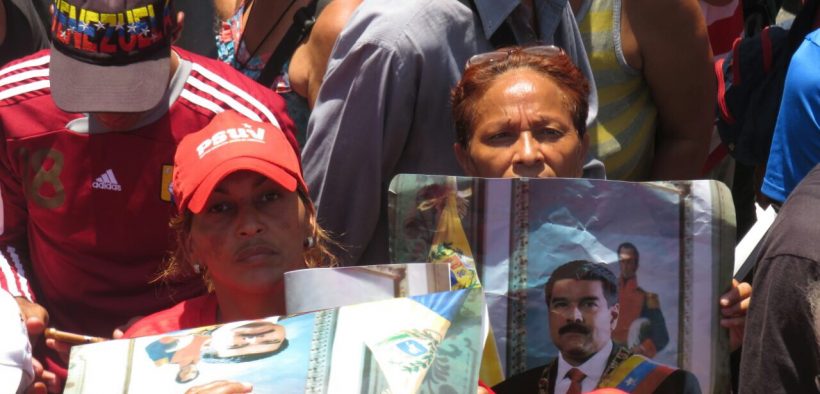
“This is happening because the Bolivarian revolution confronted the hegemonic global interests and didn’t subordinate to the American imperialism.”
“It’s all the fault of our leaders. The so-called economic war doesn’t exist; it’s only a way for officials to blame other countries for their own wrongs, as if they are not the ones to blame.”
It’s been months since Juan Guaido proclaimed himself the interim president of Venezuela and called for ending the rule of President Nicolas Maduro and met with military officers in Altamira, where la Carlota military base is in east Caracas.
Since then, the political situation is a simmering status quo. Neither the opposition nor the government can resolve the situation in its favor.
Citizen Truth spoke with Venezuelan citizens living in Venezuela to learn their opinions and thoughts about the ongoing dilemma. Venezuelans themselves are divided between Maduro and Guaido. While we don’t pretend to know what percentage of the population supports either leader, it is clear there is a widespread support of Maduro that is not often depicted in traditional U.S. media outlets.
Most importantly, each Venezuelan citizen we spoke to has their own explanation of what’s going on and whom to support; hear their thoughts below.
The Reason Behind the Venezuelan Crisis
Orlenys Ortiz, 29, a digital investigator and a prominent Chavista (supporter of the late past president Hugo Chavez) told Citizen Truth she thinks the reason behind the crisis her country is facing is multi-factional. “The right wing thinks that Venezuela is facing a humanitarian crisis. They come to this conclusion for two reasons: Their comfort and stability are affected, and they don’t know what a humanitarian crisis in international law.”

A Maduro supporter holds up a sign at a pro-Maduro rally in Caracas, Venezuela. (Photo: Orleny Ortiz)
Ortiz believes her country is facing an economic crisis that surpasses Maduro’s responsibility contrary to the opposition’s claims. “This is happening because the Bolivarian revolution confronted the hegemonic global interests and didn’t subordinate to the American imperialism,” she stated.
She realizes this economic crisis has various causes such as the lack of a well-managed means of production and distribution, governmental negligence of many national companies, partial corruption (official and individual) and the economic sanctions that represent a blockade similar to that of Cuba.
Edsel Demio, 19, a college student, told Citizen Truth that the main cause of the crisis is that the country was ruled for a long time by several left-wing populist governments that printed money and gave it to people in order to stay in power. According to Demio, this action caused the currency, the bolivar, to lose its value.
While for Carlos Mendez, 23, an illustrator, the reason behind the severe crisis in Venezuela is due to the controlling powers of foreign currencies such as the U.S. dollar and the Euro.
Guaido—a Hero for Some Venezuelans and a Puppet for Chavistas
Yanet Fermin, a deputy in the Venezuelan national assembly for the populist party in the state of Nueva Esparta, described Juan Guaido as a statesman and an expert on numbers and statistics. “The declarations of Juan Guaido contributed to the gain that society got when voting for the national assembly. This last one fostered democratic ideas and values among Venezuelans. It helps to talk about human rights and corruption and because of this we have plenty of representatives in the Organization of American States.”
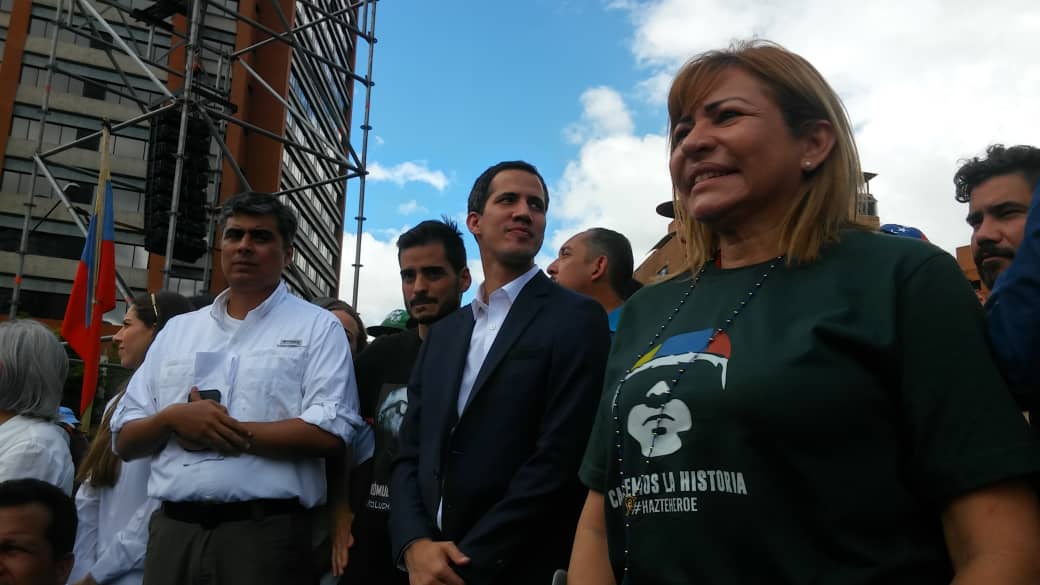
Yanet Fermin (right) on stage with Juan Guaido at a rally in support of Guaido. (Photo: Yanet Fermin)
Gertrudis (who prefers not to use her last name), a 56-year-old retired educator, told Citizen Truth she considers Guaido as a crazy man who proclaimed himself as president. “President Nicolas Maduro won the elections in a trusted manner; 67% participated in the elections. When I read things about what the Venezuelan opposition says, I think they are talking of another country; they are phony….” she added.
Ortiz thinks Guaido doesn’t have a voice of his own nor has any type of authority. She believes he receives orders and nothing more.
While Demio said he thought previously that Guaido was a solution that could end Maduro’s dictatorship, but Demio realized Guaido turned out to be just like other Venezuelan politicians who don’t have a strategy to exit from the government.
Mendez thinks that Guaido is doing his job. “At this moment I don’t know what to think; I want to say he is helping us, but I’m not sure,” he added.
Venezuelans Are on the Horns of a Dilemma
Maria Gonzalez, 57, a teacher from Nueva Esparta, Margarita Island, told Citizen Truth what she thinks of the nightmare that every Venezuelan lives right now.
“What destroyed everything was Chavismo, with the expropriation of farms, factories, businesses and shameless corruption with the incapacity of those who govern. They are criminals. People got used to be given everything and not working for it. We live a real crisis; you can imagine for a moment a rich country that has no water because they control it, the light is cut on a daily basis, oil is not available and neither is gasoline. Millions of valuable professionals in all areas have fled the country; there are almost no domestic or international flights; you cannot get a passport unless you pay a fortune; you cannot get medicines or food. This is a country where you cannot have health insurance because they ended that and in public hospitals you die of decline. What you earn is scarcely enough for you to eat, nothing more, forget about buying clothes, shoes or even to give yourself a treat.”
Gonzalez told Citizen Truth about how Venezuelans manage to live in such circumstances; she mentioned that the middle class that almost does not exist lives on family support outside of Venezuela. Others have multiple jobs to cover some living expenses. “The poorest are stuck in Local Committees for Supply and Production, and the government gives them bonuses in money and some food but that does not reach them. There is a lot of malnutrition that causes child mortality, let alone crimes, car thefts, kidnappings, robberies that are widespread in today’s Venezuela.”
Fermin from Nueva Esparta shared with Citizen Truth how she sees Venezuelans coping to live in such an economic collapse. “Today, in Venezuela we live on aid and cooperation from family and friends abroad. Very few people who do not exceed 10% live in these conditions. A significant number of Venezuelans who must already exceed 4 million have left the country because they couldn’t maintain their quality of life …,” she stated.
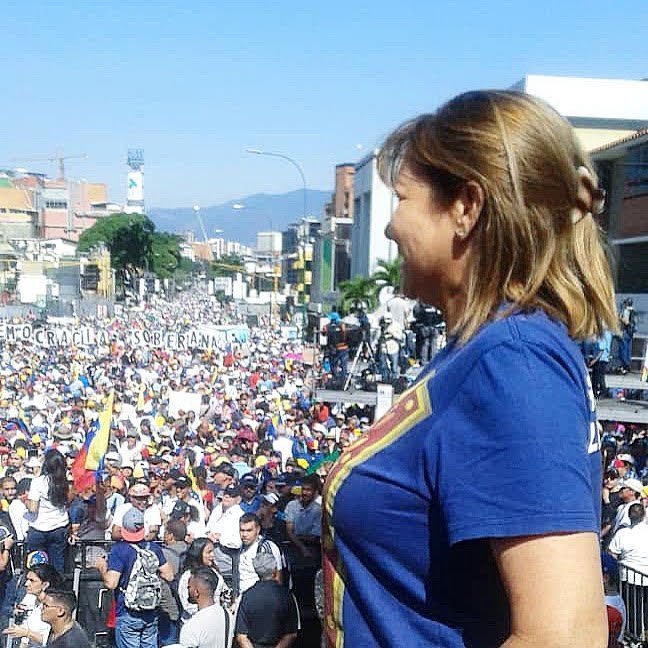
Yanet Fermin, with pro Juan Guaido rally in the background. (Photo: Yanet Fermin)
She also sees herself like all Venezuelans and struggles to bring food to the table. “The people in the streets claim services such as water, electricity, gas and transportation are under the state’s control. The Venezuelan citizen works until exhaustion, but he doesn’t even have a morsel of bread to eat, the general average 60% of the population is malnourished and eats one time a day.
I am living like everyone else; I work in an organ of the National Public Power, the National Assembly. Today, I made a great effort to get to the headquarters, I used four lines of transportation, and we were prevented from going to the Federal Legislative Palace. I do have the intention to work, but they do not let me. How can I buy food if I cannot work?” she wondered.
Gertrudis from Guacara in the state of Carabobo talked about water and electricity services in her city. “We have water; however, we stay without it on Mondays and Fridays, while for the electricity there is rationing four hours a day in the morning and in the afternoon and another in the night, maximum until 11 p.m.”
Demio described life in Venezuela as difficult, “The Venezuelan population requires dollars to live a full life; they have it from families who live abroad and from deals inside Venezuela charged in dollars. Others receive aid from the state,” he added. Demio left Venezuela six months ago and currently lives in Colombia; he said that when he was in his country, his family did transactions where they earned dollars instead of bolivars because they have no value.
Ortiz from Caracas said that the capital has optimum electricity services, and that the state of Zulia is where the situation is critical, also in Merida. She believes that the living conditions of Venezuelans won’t get better as long as sanctions are imposed because the origin of the crisis is the inability to trade freely in the international market.
Gustavo Gavidia said that it’s difficult to live with only $6 a month. “To give you an idea, $6 only buy you six chicken eggs.”
How do Venezuelans See US Intervention?
Chavistas and the Venezuelan opposition often collide about the legitimacy of a foreign country intervention. Both sides have different visions when it concerns the United States.
Chavistas consider Western political powers to be imperialists and traditional occupiers and blame the opposition for calling for the invasion of Venezuela, giving away its independence and sovereignty. On the other hand, the opposition sees that states such as United States and Colombia are only helping the Venezuelan people and that the real intervention is likely to be from Cuba and Russia.

A “Hands Off Venezuela” banner flies above a crowd at a pro-Maduro rally in Caracas, Venezuela.
Demio told Citizen Truth that military intervention from the U.S. doesn’t strike him as likely, “Seeing how things are going on, we have no choice but to receive aid from other countries, plus it seems to me that (U.S. National Security Advisor) John Bolton is pretty evil,” he added. He thinks the United States has nothing to do with the Venezuelan crisis. “It’s all the fault of our leaders. The so-called economic war doesn’t exist; it’s only a way for officials to blame other countries for their own wrongs, as if they are not the ones to blame.”
Gonzalez said she doesn’t blame anyone else but the Chavismo Madurismo. She stated, “They destroyed everything. The U.S. should do something like what they did in Panama to help us.”
Gertrudis has a different point of view. “No Venezuelan should call for intervention out of disagreement. These calls are unforgivable because they are actions of statelessness and betrayal.”
Fermin considers the United States a democratic country that is concerned with the problems that Venezuela creates in the region. “Juan Guaido has never called for the occupation of Venezuela; he is making a wake-up and cooperation call to overcome a crisis that by its magnitude the people of Venezuela cannot overcome it on its own.”
Ortiz responded when asked about Juan Guaido’s allegation that the only intervention in Venezuela is by Cubans and Russians. “That responds to the fear that people have been getting for decades against communists, so that they hate them, and this way their interests (opposition) of domination won’t be affected. Nothing from what Guaido says has a historical or legal support, nothing.”
She continued by saying that Russia and Cuba have been always friends of Venezuela. “There are many legal agreements of investments and exchanges between the parties. It’s stupid to say they are intervening, it’s ridiculous ….”
Valencia vibra hoy con más esperanza de Libertad y Democracia pic.twitter.com/989F8J4lFj
— Nelson Bocaranda S. (@nelsonbocaranda) February 2, 2019
Ortiz told Citizen Truth that the opposition is using certain American superheroes such as Spiderman and Captain America to convince people that U.S. intervention is the real salvation; even some churches have employed that too, she says. She contemplates this is a result of the cultural influence the U.S. has on the Venezuelan opposition.
¡Hasta Spiderman se le volteó a Maduro! El vengador patriota está con Guaidó (LA FOTO) https://t.co/q9Tffv4g1d
— La Patilla (@la_patilla) February 12, 2019
Can Chavismo Survive the Venezuelan Crisis?
Ortiz attended many of the pro-Maduro rallies, mainly that of April 30 at Miraflores Palace in Caracas, a few hours after Guaido called for the military to oust the president. Her live stream of the rally on Twitter went viral and showed how people were going to work like normal in the Venezuelan capital city, while TV stations were reporting at that time that Caracas was out of control.
She shared with Citizen Truth pictures and videos of the Miraflores protest and another massive rally on May 1, the international day of labor. She thinks these huge protests were not broadcast or shown by the biggest international TV stations and newspapers. “All the opposition errors and threats of a military intervention, the attacks on the electric system and the sanctions have strengthened chavismo. The last mobilization of chavismo was gigantic, as hadn’t been done in years,” she stated.
Ortiz thinks that chavismo was strong when Hugo Chavez was in power; nowadays, she sees that it’s more powerful than it was five years ago despite the siege and the attempt at a coup d’etat of Maduro. She believes the opposition is weaker and has fewer people in its marches.
She also believes there’s a digital war on Chavistas. In 2017, Twitter banned her account so she had to open another and to start a channel on Telegram where she shares pictures, videos and live streams. She says it’s to defend the Bolivarian revolution and to end fake news about her country.
Ortiz feels that the crisis has opened the eyes of many Venezuelans and revealed some realities that many Venezuelans previously were unaware of. “It served us by demonstrating how the American government and the Venezuelan right wing are incompetent, hypocritical and criminal. If it didn’t happen we’d be terribly lethargic.”
Solutions as Suggested by Venezuelans
Fermin believes that the solution lies within the country’s means. She believes in organizing demonstrations and keeping it democratic within the framework of the national constitution to cease an illegal usurpation.

Pro Maduro rally in Caracas, Venezuela.
Demio estimates that under another government they can recover the economy by bringing back Venezuelan professionals and also make use of the natural resources his country has. To him, it all depends on good governance.
Gavidia believes that to save the country, both parties should sit down and talk, while Gonzalez believes the solution is to get out of the current regime and call for a free and fair election. This way, they can together rebuild Venezuela.
Gertrudis thinks the exit to this crisis depends on ending the sanctions on Venezuela and not imposing new ones. “Venezuela is the homeland of everyone; we are a single people with differences. We can work it out without any intervention. They should leave us in peace.”
Ortiz, for her part, thinks the division in Venezuelans can be solved by addressing the difficult living conditions of Venezuelans and by fostering tolerance within the society, although she thinks it is impossible to improve living conditions as long as sanctions exist.
In a polarized country where an international intervention is seen as an act of betrayal to some and to others, a lifeline from a hellish situation, a solution seems murky and far off. Yet, Venezuelans from all parts keep hoping their country will surpass the crisis and return to a sense of stability and prosperity.

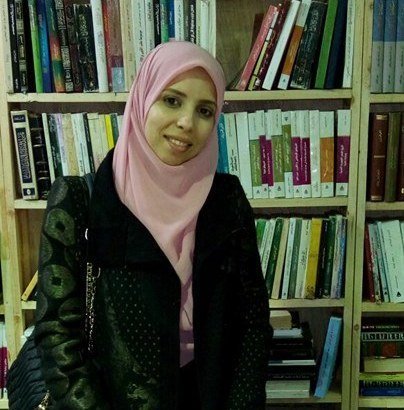







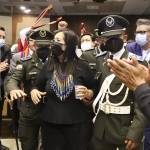
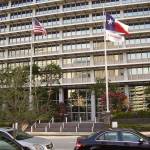


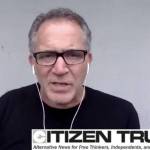

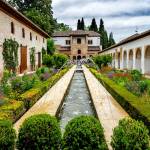

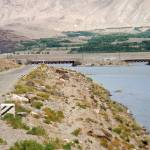
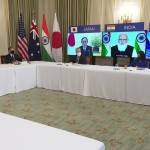
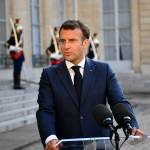
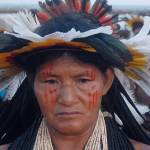
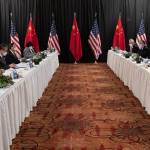
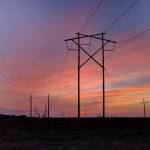


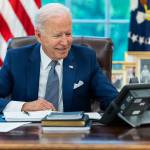

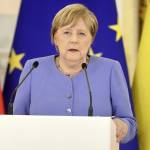
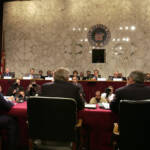



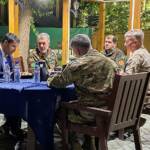











los estados unidos que vallan a la chingada, que cada rancho cuide su rancho!!!!!!!!!!!!!!!!!!!!
Muy buena apreciación desde cada punto de vista
The situation in Venezuela is so bad that even ultra left wing communist publications like this one don’t have a way of sugar coating it anymore. They went out there looking for “different view points” all they got were people screaming left and right for someone to rescue them from the socialist dystopian nightmare they found themselves in.
OK ‘FRED’ – being bought by the US or just stupid ? Venezuela has it’s faults -but if your dear US would cut the sanctions and the EU wouldn’t be so stupid to follow a (typical puppet nowadays) – prepped a US nobody – the people IN their country would solve this. I’ve seen too many US ‘overtakes’ in, my lifetime -ALL WENT WRONG for the people of the country involved.